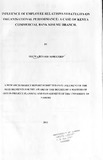| dc.description.abstract | Employee relations strategy is an integral element of organizational strategic blue print. Employee relations strategy is the employee-employer relationship which govern the rules of employment. In today's competitive business environment organizations are faced with the challenge of employee retention caused by high employee turnover and inadequacy in human resource talents and skills in the market, therefore most organizations are implementing policies to ensure that they become the employer of choice thereby enabling them to compete for the limited human resource talents and skills in the market. Employee is a major asset valued greatly by the organization.
This study was set out to verify how true the statement is. The study established how employee relations strategies influence operations of an enterprise. This research study established the employee relations strategies implemented by banking institutions in order to improve their overall organizational performance and to enhance the achievement of organizational goals. The research study was also set to come up with new ways of improving employee relations in banking institutions and other forms of organization. The study established the relationship between employee relations strategies and organizational performance and ways of building up an employer of choice model to maximize organizational performance.
The research study reviewed literature on the topic of study based on five components of employee relations strategies namely; staffing and promotions, employee training and development, performance appraisal, job analysis and job description and finally employee reward system. The study analyzed Human relations theory constructed by Elton Mayo in 1933 as theoretical framework guiding the study which formed the basis for perceived conceptual framework in the study. The research study was carried out at Kenya Commercial Bank Ltd; Kisumu Branch targeting all their employees at all levels of the organizational structure.
The sample population of the study included all the sixty of the branch's staff population and the research design was descriptive with instrumentation of questionnaires and in-depth interview of top level management, sampling design was used in the research study, data collection was stratified using random sampling since the research was not dealing with homogenous respondents. Data collected was analyzed using SPSS version 12 and presented in tables to allow for cross comparison according to the objective of the study. The study found that staffing and promotions, employee training and development, performance appraisal, job analysis and job description and finally employee reward system as components of employee relations strategies significantly influence organizational performance and therefore various strategies to strengthen these components of employee relations strategies should be put in place. The study recommended that a similar study should be carried out in various organizations in other sectors of the economy to complement the findings. | en_US |

